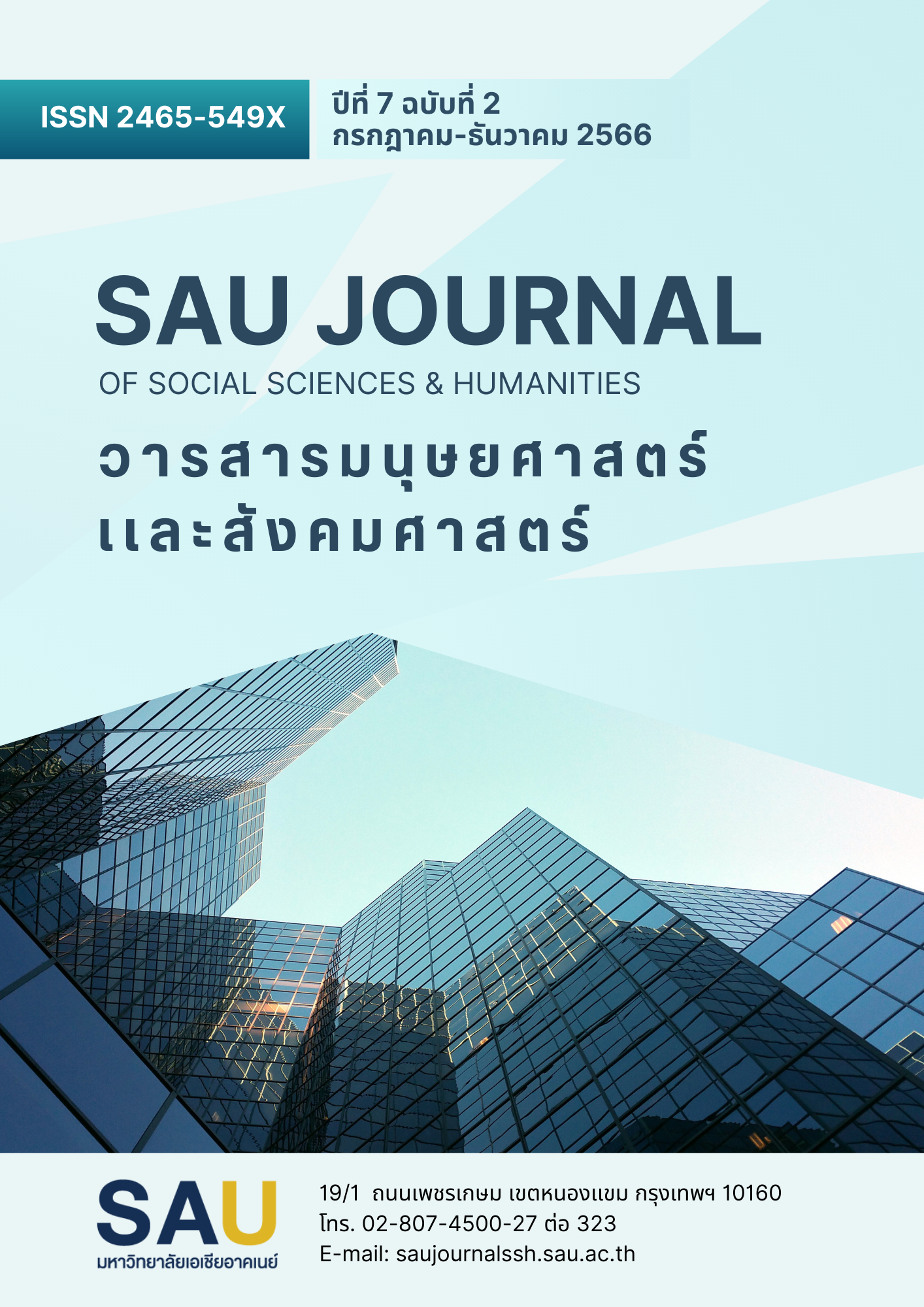The Factors Affecting Knowledge Sharing of University Teachers in Nanning Guangxi Zhuang Autonomous Region, China
คำสำคัญ:
knowledge sharing, university teacher, reward systemบทคัดย่อ
This study aims to 1) study factors affecting the knowledge sharing of university teachers in Nanning, Guangxi Zhuang Autonomous Region, China, and 2) provide guidelines for manage university personnel to achieve the sharing of knowledge. The sample group included 372 university teachers. The research used quantitative research methods, data were analyzed to perform descriptive analysis, correlation analysis, and multiple regression analysis. The results showed that the predictive variables including organizational support, organizational culture, personal attitudes, self-efficacy, interpersonal trust, and use of social media all had a significant effect on the criteria variable knowledge sharing, while the reward system has an non-significant impact on knowledge sharing. This investigation suggests that to achieve knowledge sharing among university teachers, organizations should provide teachers with specific assistance and support. It is crucial to cultivate a positive cultural environment that encourages teachers to share their knowledge enthusiastically, boost their self-efficacy, offer appropriate social media platforms, and promote the open sharing of knowledge and experiences. Furthermore, it provides guidance for the future establishment of comprehensive reward systems to incentivize knowledge sharing of university teachers.
เอกสารอ้างอิง
Al‐Alawi, A. I., Al‐Marzooqi, N. Y., & Mohammed, Y. F. (2007). Organizational culture and knowledge sharing: critical success factors. Journal of knowledge management, 11(2), pp.22-42.
Bandura, A., Bandura, S., & Bandura, A.(1986) Social foundation of thoughts and actions: Asocial cognitive theory. Journal of Applied Psychology, 12(1), p.169.
Basu, B. & Sengupta, K. (2007). Assessing Success Factors of Knowledge Management Initiatives of Academic Institutions – a Case of an Indian Business School. Electronic Journal of Knowledge Management, 5 (2), pp.273-282.
De Vries, R. E., Van den Hooff, B., & De Ridder, J. A. (2006). Explaining knowledge sharing: The role of team communication styles, job satisfaction, and performance beliefs. Communication research, 33(2), pp.115-135.
George, J. M., & Brief, A. P.(1992). Feeling good-doing good:A conceptual analysis of the mood at work organizational spontaneity relationship. Psychological Bulletin, 112, pp.310-329.
Homans, G. C. (1958). Social behavior as exchange. American Journal of Sociology, 63, pp.597–606.
Kugel, J., & Schostek, C. (2004). Knowledge sharing: rewards for knowledge sharing.
Liang, Z., & Shi, W. (2008). Analysis of ratings on trust inference in open environments. Performance Evaluation, 65(2), pp.99-128.
Lu, L., Leung, K., & Koch, P. T. (2006). Managerial knowledge sharing: The role of individual, interpersonal, and organizational factors. Management and Organization Review, 2(1), pp.15-41.
Ministry of Education of the People's Republic of China.(2018). Notice Issued by the Ministry of Education and Five Other Departments on the Implementation of the 'Teacher Education Revitalization Action Plan (2018-2022). Available from http://www.moe.gov.cn/srcsite/A10/s7034/201803/t20180323_331063.htm
Ryan, S. D., Windsor, J. C., Ibragimova, B., & Prybutok, V. R. (2010). Organizational practices that foster knowledge sharing: Validation across distinct national cultures. Informing Science, 13, p.139.
Trehan, A. & Kushwaha, P. (2012). The implementation of Knowledge Management System in B-Schools. International Journal of Multidisciplinary Management Studies, 2(2).
Wang, J. (2005). School Knowledge Management Strategies to Promote Teachers' Individual Knowledge Sharing. Educational Theory and Practice, 25(8), p.1.
Xu, L., & Li, Z. (2022). Factors affecting the knowledge sharing behaviors of university teachers: An empirical study in china. Int. J. Inf. Educ. Technol, 12, pp.36-42.
Yue, D. (2015) A Study on the Factors that Impact Teacher Knowledge Sharing (Master's Theses, Northeast Normal University, China).
Zhang, L. (2022) A Study on the Impact of Organizational Support on Knowledge Sharing among College and University Teachers—Self-efficacy as a Mediated VaYue, D(2015) A Study on the Factors that Impact Teacher Knowledge Sharing (Master's Theses, Northeast Normal University, China).
Zhou, C., & Sun, Q. (2006). Factors and Strategies for Low Teacher Knowledge Sharing Willingness. Educational Development Research, (10), p.31.
Zhu, H. (2004). Critique of Teacher Management Phenomenon under the "Non-Knowledge Sharing" Context. Teacher Training Research, (3), p.12.






